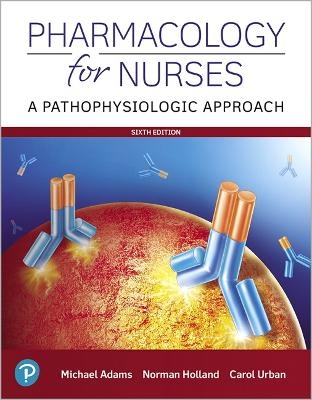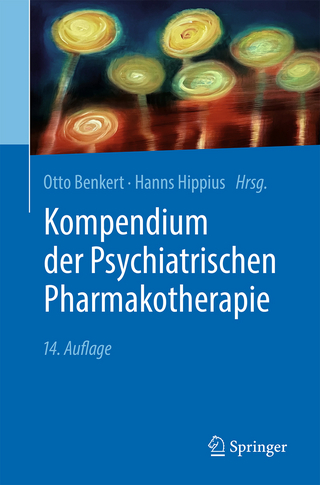
Pharmacology for Nurses
Pearson (Verlag)
978-0-13-521833-4 (ISBN)
A holistic approach to pharmacology essentials
Pharmacology for Nurses: A Pathophysiologic Approach simplifies pharmacology by linking it tightly to therapeutic goals. Instead of learning about drugs in isolation, students approach them by body systems and diseases in order to draw connections between A&P, diseases, and drug interventions. Engaging features and exercises relate pharmacology to nursing care, while discussion of alternative therapies and cultural and lifespan considerations give further context for clinical decisions. The 6th edition adds the most current pharmacotherapeutics and advances in pathophysiology.
Also available with MyLab Nursing
By combining trusted author content with digital tools and a flexible platform, MyLab personalizes the learning experience and improves results for each student. MyLab Nursing helps students master key concepts, prepare for success on the NCLEX-RN® exam, and develop clinical reasoning skills.
Note: You are purchasing a standalone product; MyLab Nursing does not come packaged with this content. Students, if interested in purchasing this title with MyLab Nursing, ask your instructor to confirm the correct package ISBN and Course ID. Instructors, contact your Pearson representative for more information.
About our authors Michael Patrick Adams, PhD, is an accomplished educator, author and national speaker. The National Institute for Staff and Organizational Development in Austin, Texas, named Dr. Adams a Master Teacher. He has published two other textbooks with Pearson Publishing: Core Concepts in Pharmacology and Pharmacology: Connections to Nursing Practice. Dr. Adams obtained his master’s degree in pharmacology from Michigan State University and his doctorate in education from the University of South Florida. Dr. Adams was on the faculty of Lansing Community College and St. Petersburg College, and served as Dean of Health Professions at Pasco-Hernando State College for 15 years. He is currently Adjunct Professor of Biological Sciences at Pasco-Hernando State College and Hillsborough Community College. Leland Norman Holland, Jr. PhD (Norm), over 25 years ago, started out like many scientists, planning for a career in basic science research. He was quickly drawn to the field of teaching in higher medical education, where he has spent most of his career. Among the areas where he has been particularly effective are preparatory programs in nursing, medicine, dentistry, pharmacy and allied health. Dr. Holland is both a professor and supporter in nursing education nationwide. He brings to the profession a depth of knowledge in biology, chemistry and medically related subjects such as microbiology, biological chemistry and pharmacology. Dr. Holland’s doctoral degree is in medical pharmacology. He is very much dedicated to the success of students and their preparation for careers in health care. He continues to motivate students in the lifelong pursuit of learning. Carol Quam Urban, PhD, RN, Associate Professor, is Director of the School of Nursing and Associate Dean for Practice and Strategic Initiatives in the College of Health and Human Services at George Mason University in Fairfax, Virginia. She has been on the faculty at Mason and considers the study of pharmacology to be a course that truly integrates nursing knowledge, skills and interdisciplinary teamwork. She credits her students, past and present, for providing a never-ending source of real-world stories that make learning about pharmacology enjoyable in class. She has also published the Pearson textbook Pharmacology: Connections to Nursing Practice with Dr. Adams.
UNIT 1: CORE CONCEPTS IN PHARMACOLOGY
Introduction to Pharmacology
Drug Approval and Regulation
Principles of Drug Administration
Pharmacokinetics
Pharmacodynamics
UNIT 2: PHARMACOLOGY AND THE NURSE-PATIENT RELATIONSHIP
The Nursing Process in Pharmacology
Medication Errors and Risk Reduction
Drug Administration Throughout the Lifespan
Individual Variations in Drug Response
The Role of Complementary and Alternative Therapies in Pharmacology
Emergency Preparedness and Poisonings
UNIT 3: THE NERVOUS SYSTEM
Cholinergic Drugs Affecting the Autonomic Nervous System
Adrenergic Drugs Affecting the Autonomic Nervous System
Drugs for Anxiety and Insomnia
Drugs for Seizures
Drugs for Emotional, Mood, and Behavioral Disorders
Drugs for Psychoses
Drugs for the Control of Pain
Drugs for Local and General Anesthesia
Drugs for Degenerative Diseases of the Nervous System
Drugs for Neuromuscular Disorders
Substance Abuse
UNIT 4: THE CARDIOVASCULAR AND URINARY SYSTEMS
Drugs for Lipid Disorders
Diuretic Therapy and Drugs for Renal Failure
Drugs for Fluid Balance, Electrolyte, and Acid--Base Disorders
Drugs for Hypertension
Drugs for Heart Failure
Drugs for Angina Pectoris and Myocardial Infarction
Drugs for Shock
Drugs for Dysrhythmias
Drugs for Coagulation Disorders
Drugs for Hematopoietic Disorders
UNIT 5: THE IMMUNE SYSTEM
Drugs for Inflammation and Fever
Drugs for Immune System Modulation
Drugs for Bacterial Infections
Drugs for Fungal, Protozoan, and Helminthic Infections
Drugs for Viral Infections
Drugs for Neoplasia
UNIT 6: THE RESPIRATORY SYSTEM
Drugs for Allergic Rhinitis and the Common Cold
Drugs for Asthma and Other Pulmonary Disorders
UNIT 7: THE GASTROINTESTINAL SYSTEM
Drugs for Peptic Ulcer Disease
Drugs for Bowel Disorders and Other Gastrointestinal Conditions
Drugs for Nutritional Disorders
UNIT 8: THE ENDOCRINE SYSTEM
Drugs for Pituitary, Thyroid, and Adrenal Disorders
Drugs for Diabetes Mellitus
Drugs for Disorders and Conditions of the Female Reproductive System
Drugs for Disorders and Conditions of the Male Reproductive System
UNIT 9: THE INTEGUMENTARY SYSTEM, EYES, AND EARS
Drugs for Bone and Joint Disorders
Drugs for Skin Disorders
Drugs for Eye and Ear Disorders
Appendices
Answers
Institute for Safe Medication Practices (ISMP): ISMP's List of Error-Prone Abbreviations, Symbols, and Dose Designations
Institute for Safe Medication Practices (ISMP): ISMP List of High-Alert Medications in Acute Care Settings
Calculating Dosages
| Erscheinungsdatum | 15.01.2019 |
|---|---|
| Sprache | englisch |
| Maße | 100 x 100 mm |
| Gewicht | 100 g |
| Themenwelt | Medizin / Pharmazie ► Medizinische Fachgebiete ► Pharmakologie / Pharmakotherapie |
| Medizin / Pharmazie ► Pflege ► Ausbildung / Prüfung | |
| ISBN-10 | 0-13-521833-0 / 0135218330 |
| ISBN-13 | 978-0-13-521833-4 / 9780135218334 |
| Zustand | Neuware |
| Informationen gemäß Produktsicherheitsverordnung (GPSR) | |
| Haben Sie eine Frage zum Produkt? |
aus dem Bereich


